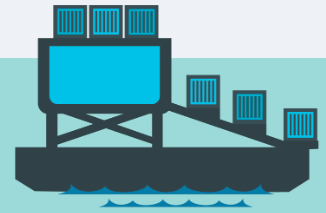Docker Tightens its Embrace of Kubernetes

The rise of application containers has touched off a debate about whether containers will eventually replace virtual machines. For a number of reasons, most notably security, probably not. At least not anytime soon.
What’s striking is how similar the container and VM camps sound in promoting their latest platforms. This week, Docker unveiled the latest enterprise version of its container platform, noting that it can help automate the “development-to-production” pipeline while allowing users to run legacy as well as cloud-native applications in datacenters, on hybrid clouds or edge devices.
Roughly the same value proposition was made earlier in the week when Dell Technologies (NYSE: DELL) announced an extension of its VMware cloud running on hyperconverged Dell EMC infrastructure. That configuration underpinned by virtual machine technology also is billed as a service spanning datacenter to edge applications.
For its part, Docker said this week the third edition of its enterprise container platform covers the application waterfront with new development tools and—in a nod to ongoing container security concerns—a simplified and secure Kubernetes stack.
Concerns about the security of the cluster orchestrator came into sharp relief late last year when something called a “privilege escalation vulnerability” surfaced in versions 1.0 and higher of the Kubernetes orchestrator along with Red Hat OpenShift container platform. Red Hat (NYSE: RHT) rated the vulnerability as “critical,” denoting its potential impact on production operations.
Hence, Docker and other adopters of the popular container orchestrator are emphasizing security as they roll out new versions of their platforms. Docker’s Enterprise 3.0 edition released on Tuesday (April 30) is touted as a simple and secure way to for deploy and scale container and Kubernetes-based applications.
To that end, the latest Docker platform emphasizes new Kubernetes deployment and scaling services, further advancing Kubernetes’ position as the de facto standard for container orchestration. Docker noted only in passing that its new Kubernetes services work with its in-house orchestrator, Docker Swarm, which now appears to be fading down the stretch despite the advantages of tight coupling to the Docker ecosystem and what some observers consider its superior ability to scale container deployments.
As did Dell a day before, Docker touted its upgraded container platform as a managed service for datacenter or cloud deployments. The enterprise service designed to help customers provision and run the Docker container platform running on-premises or in public cloud will initially be offered in partnership with the Paris-based technical consultant CapGemini (OTCMKTS: CAPMF).
Dell Technologies’ VMware cloud platform runs on Amazon Web Services (NASDAQ: AMZN), and the company also announced an extended cloud partnership to run applications on Microsoft Azure (NASDAQ: MSFT).
Among the other bells and whistles added to the new Docker platform are a suite of automation tools designed to smooth out the bumps between development and production, including a developer desktop, a secure image registry with access to Docker Hub and production deployment that conforms with Kubernetes.
Docker Enterprise 3.0 is available now for beta testing.
Related
George Leopold has written about science and technology for more than 30 years, focusing on electronics and aerospace technology. He previously served as executive editor of Electronic Engineering Times. Leopold is the author of "Calculated Risk: The Supersonic Life and Times of Gus Grissom" (Purdue University Press, 2016).










